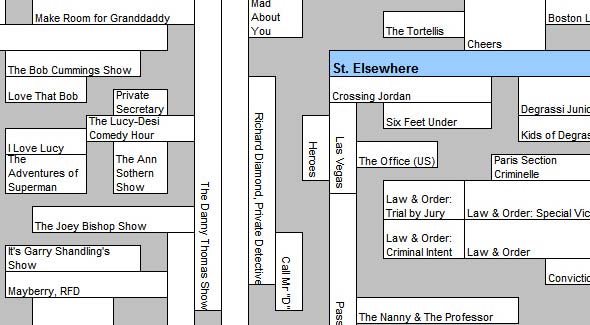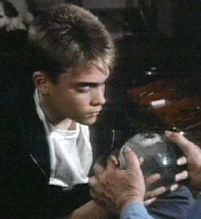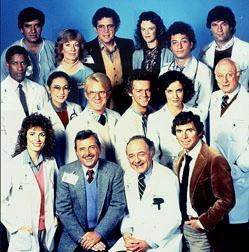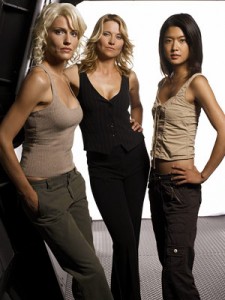
In scientific publications, most of the articles are original research. There are also review articles–overviews of the work that’s been done on a particular problem, for the benefit of those in the field who want to keep up.
This is a review article on the Tommy Westphall Hypothesis. I’m not introducing any brilliant new observations of my own. But if you’ve never heard of Tommy, and you like Overthinking™ stuff, let me get you up to speed.
 Dr. Donald Westphall was one of the main characters on the 1980’s NBC medical show St. Elsewhere. Tommy was his autistic son. The final episode aired May 25, 1989. In the last scene, Donald Westphall returns home, and based on his clothes and conversation, it’s clear he’s a construction worker, not a doctor. Donald looks at Tommy and says, “I don’t even know if he can hear me, because he sits there, all day long, in his own world, staring at that toy. What’s he thinking about?” The toy is a snow globe containing the hospital the series was set at.
Dr. Donald Westphall was one of the main characters on the 1980’s NBC medical show St. Elsewhere. Tommy was his autistic son. The final episode aired May 25, 1989. In the last scene, Donald Westphall returns home, and based on his clothes and conversation, it’s clear he’s a construction worker, not a doctor. Donald looks at Tommy and says, “I don’t even know if he can hear me, because he sits there, all day long, in his own world, staring at that toy. What’s he thinking about?” The toy is a snow globe containing the hospital the series was set at.
The ending’s a bit ambiguous, but the most common interpretation is the entire show was just a figment of Tommy’s imagination. In other words, it was all a dream.
First of all, I have nothing but pity for the poor fans of St. Elsewhere. I’ve watched a lot of series finales in my day, and never have I said to myself, “I really hope it turns out everything I spend the last six years watching was a dream.” Can you imagine what the fans of Lost would do if the last episode ends like this? There would be riots.

All these people are not only fictional, but fictional within the fiction. If this hurts your brain, now would be an excellent time to bail out.
Anyway, the characters of St. Elsewhere are apparently in Tommy’s mind. The trouble is, St. Elsewhere doesn’t exist in a vacuum. For instance, there was one episode of the show where the doctors go out for a drink at a bar called Cheers. And yes, it was that Cheers, complete with Rhea Perlman telling them off. But if characters from St. Elsewhere and Cheers interacted, then that means the two shows share the same universe. And if St. Elsewhere is in Tommy’s mind, then so is Cheers.
But if you accept that Cheers is all part of Tommy’s dreamworld, then of course Frasier is as well. And in one episode of Frasier, Daphne is complaining about a “Caroline in the City” comic strip, which means Caroline in the City is all a dream too.
Stick with me now.
On one episode of Caroline, Caroline’s friend Annie runs into Chandler Bing in a video store. Chandler is, of course, one of the Friends. Phoebe’s sister, Ursula, is a character on Mad About You. On one episode of that show, Paul is doing a documentary on the history of television, and he wants Alan Brady to do the narration. Alan Brady was the star of the fictional Alan Brady Show, within The Dick Van Dyke Show. And that destabilizes a whole pocket of classic TV, sucking The Brady Bunch, Batman, and The Addams Family into Tommy’s mind.
This is the Tommy Westphall Hypothesis: St. Elsewhere and any show that can be shown to share a fictional universe with St. Elsewhere are all daydreams. It’s hard to say who originated this idea, but there’s a good chance it was Dwayne McDuffie. He’s a comic book/TV writer, and in 2002 he explained the Hypothesis very well in an issue of Slush Factory, a magazine primarily about comics (I can’t find the article at the Slush Factory site, but you can read it here). McDuffie presents the Hypothesis as his own, and since I can’t find any pre-2002 mentions of it, I’m prepared to tip my hat to him. (Actually, I’d tip my hat to him in any case for his writing on the Cartoon Network’s Justice League.)
In the article, McDuffie invites readers to send him more crossovers:
All of these would help me prove my Grand Unification Theory, which posits: “The last five minutes of St. Elsewhere is the only television show, ever. Everything else is a daydream.”

Are they really Cylons? Only Tommy knows for sure. (See upper-left quadrant of chart, attached to Angel.)
Seven years later, not every show has been tied to Tommy, but the rabbit hole goes pretty deep. Behold this. It’s a fairly epic chart put together by “Crossoverman,” showing all 282 shows currently linked to St. Elsewhere. If there was a Nobel Prize for charts, this would get my vote. But to understand it, you’ll have to consult the key, which explains exactly why these shows are linked. For instance, if you look at the chart and see the big box at the top center, you’ll notice The X-Files and Homicide: Life on the Street are linked. Now go to the key and search for “X-Files”: you’ll find that Detective Munch once questioned the Lone Gunmen.
Even if you don’t put any stock in the Westphall Hypothesis, perusing the chart is definitely a lot of fun. I am in awe of Crossoverman’s work. That’s not to say, however, that I agree with every single link. As the blog Yesterday’s Salad pointed out, some links are stronger than others. For example, there was an episode of the tween soap Degrassi Junior High in which a “Dr. Donald Westphall” is paged in a hospital scene. The character never shows up – it’s just a name over an intercom. Does this prove that Degrassi and St. Elsewhere share the same universe?
Examining the chart myself, I was at first excited to see Lost on there. After all, it would be cool to be able to say, “I know what’s really going on in Lost.” But when I checked out how it’s linked into the chart, I was disappointed. Both Diagnosis Murder and Lost feature an “Oceanic Airlines.” That’s it. Personally, I think “Oceanic” is a pretty generic airline name, and hardly proof the two shows coexist.
So you can nitpick exactly how many shows are in play here. But even if you insist that only a real crossover of fictional characters should tie a show to the Westphallverse, that still leaves you with a pretty big web. And I’ve got to admit, it disturbs me. I really don’t want The Office to be just a figment of Tommy’s imagination. But of course, The Office isn’t real. It’s 100% made up, and I know this. And yet, the idea that it might be not only fake but doubly fake is unsettling. And it’s unsettling that it’s unsettling. If anyone knows a good German word for “a wearying level of reflexivity,” pass it along.

Professor Weatherson, putting his PhD to good use. (That wasn't meant to be sarcastic - seriously, read the article.)
Luckily for me, there are plenty of good ways to poke holes in the theory. In fact, Brian Weatherson, an Associate Professor of Philosophy at Rutgers, wrote an admirably Overthought article back in 2004 called Six Objections to the Westphall Hypothesis. Some of these are pretty weak (#4 is basically: The writers of Cheers clearly didn’t intend for their show to be set in Tommy’s dream, so we should give them a break and assume it’s not.) But some are pretty compelling. For instance, just because we dream about something doesn’t necessarily mean it exists only in a dream.
I could have a dream where I’m catching Pedro Martinez as he strikes out 22 Yankees to clinch the ALCS. Again, that wouldn’t mean Pedro Martinez, or the New York Yankees, or the American League are not real.
Basically what this means is, maybe we can build a firewall around St. Elsewhere and save other shows from the gaping maw of Tommy’s fantasy. For instance, let’s say that Tommy had once visited the Cheers bar (unlikely, since he’s a kid, but you never know). In that case, he could have imagined his pretend St. Elsewhere doctors visiting a real place and meeting a real waitress. This seems to be the most common argument against the theory that I’ve read on the internet.
But there’s a simpler reason the Tommy Westphall Hypothesis just has to be wrong: there is no way an autistic boy who spends all day at home staring at a snow globe would be able to imagine even one TV series worth of stories. How could Tommy think up police procedurals, courtroom dramas, or high school melodramas?
On the other hand, autistic people often have amazing powers of memorization. Maybe Tommy spends his days not staring at the snow globe (as his dad thinks) but rather memorizing every page in an encyclopedia, thus learning enough crime scene jargon to dream up CSI.
On the other other hand, do we really believe that Tommy – not just a child, but an autistic child – has the emotional maturity to imagine 208 shows worth of friendships, rivalries, and sexual relationships? In fact, it’s not even plausible to believe Tommy dreamed up St. Elsewhere. How would he know so much about medicine, if his dad really is a construction worker?
And so we circle back to my very first point: this is a lame ending to a TV show. Not only is it unsatisfying, it just doesn’t make sense. Tommy couldn’t have dreamed up 137 episodes of this show. And if he didn’t dream up St. Elsewhere, than I definitely think Heroes is safe.
Incidentally, the actor who played Tommy has a website you should really take a look at.

Wow, Chad Allen’s website looks like 1990 (after-school specials and all!) threw up on the internet!
The simplest explanation for it would be Cheers is a television show in both the real world and Tommy’s “real world”. Tommy saw an episode of Cheers, and then imagined the St. Elsewhere characters interacting with characters from the characters in Cheers.
If the St. Elsewhere characters had appeared in Cheers we’d have a problem. Because the Cheers characters appeared in St. Elsewhere, there is no problem.
I was just going to post essentially the same idea that donn pointed out.
It would appear that Tommy might just be really into weird fanfic.
@Donn and Cushman – You’re right, of course, but the “Cheers exists as a TV show within St. Elsewhere” hypothesis doesn’t satisfy me. It means that St. Elsewhere is “more real” than Cheers (and 280 other shows), which I’m not willing to concede.
“more real”? They’re both equally unreal (scripted television shows not based on actual events or actual people existing in non-existent locations). We’ve seen multiple instances of television series existing as television series within other television series so that can’t be used as a determinant of which is “more real”. If a creator decided to show twenty contemporary television shows in their show as television shows, that would not make that show “more real”.
It may not be satisfying but the mind recoils from the alternative.
@Donn – I know, I know, you’re totally right. The thing I keep forgetting is, just because the city of Boston exists in St. Elsewhere doesn’t mean it’s not a real city. Similarly, just because Cheers is a TV show in St. Elsewhere doesn’t mean it’s not also a feature of the “real world.”
Of course, to really figure out how well the “Tommy’s watching TV” theory holds up, you’d have to look at it on a case by case basis, make sure it all adds up. For instance, there’s an episode of Homicide in which they investigate a St. Elsewhere Doctor. Under what I’ll call The Donn Theory, Tommy is imagining this episode. This episode is fan fiction, but the other episodes of Homicide are real. HOWEVER, there are probably things that happen in this episode that are referred to in subsequent episodes.
SOLUTION: That episode of Homicide is not only Tommy’s fan fiction, it actually replaces another, “true” episode of Homicide we never got to see, in which some of the same things happen, but with a non-St. Elsewhere doctor. In other words, when we watch TV, we’re watching it through Tommy’s eyes, with certain scenes and episodes changed to incorporate his dreamworld.
Actually Donn, your theory may be even creepier than the original theory. Well done!
I’m worried that if one were to accept the Tommy Westphall Hypothesis, it might shatter my perception of my very own existence.
1. If all of these TV shows are in Tommy’s head, how do I know about them?
1a. Am I in Tommy’s imagination?
1b. Is OTI a Tommy creation?
1c. How does Jeopardy! know to ask answers about the shows that are in Tommy’s imagination?
…
1x. Is Tommy God?
1y. If Tommy is God, and I am in his imagination, and the world is in his imagination, why does he keep imagining religious wars that do not center around Tommy?
1z. If Tommy created these shows, and I know about them, and therefore I am also in Tommy’s imagination, then all TV shows and movies (including the dirty ones) must be Tommy creations as well.
Alternatively, is Tommy’s brain being pumped for TV and film ideas? Wouldn’t Tommy stand to gain quite a bit from intellectual property rights lawsuits re: film adaptations of TV shows, remakes, and merchandising? Does Tommy have a brother that recognizes this and can take advantage of Tommy’s rightful forthcoming wealth?
@cushman We’re actually all in the imagination of God, who creates television shows to test how we’ll react to them on OTI.
By the way, the more I read about St. Elsewhere, the more I feel that Tommy’s snowglobe was an appropriate ending to the show. It always had a self-reflexive streak (the finale featured a fat opera singer who had lost her voice – the doctors needed to help her sing).
David Foster Wallace wrote an extremely difficult but masterful article about irony in television, which disects an episode of St. Elsewhere in great detail. PDF is available here:
http://www.zimbio.com/go/http://jsomers.net/DFW_TV.pdf
But I warn you – Wallace makes OverthinkingIt look like Perez Hilton.
@cushman: But wait, if (according to Wikipedia) Mark Tinker and John Masius developed the show St. Elsewhere, clearly they also developed Tommy. Tommy is a product of their imaginations. Therefore, Tinker and Masius must be God.
…to say nothing of Tinker and Masius’ parents, which… oh hell, never mind.
For instance, there’s an episode of Homicide in which they investigate a St. Elsewhere Doctor. Under what I’ll call The Donn Theory, Tommy is imagining this episode.
No, the Homicide episode in question is not acknowledged as legitimate by the High Church of Tommy. The Homicide connection, and all poisoned branches that spring from it, are little more than Gnostic heresy. You’ll have to do better than that if you want to corrupt us YOU SATANIST.
Hold the phone, Belinkie. Are you saying people with autism (and that’s the proper way to say it- “autistic” is best used when referring to the behavior or traits, but not the individual, for it makes the autism being referred to their only characteristic, makes them nothing but a disability) are incapable of experiencing relationships? Yes, their relationships may (and that’s a big ‘may’) be a lot more simplistic, but they are no less real than those of people without autism. And even if Tommy’s autism makes him incapable of completely understanding the complexities of the mature adult relationships he observes around him, he still has the potential to at least mimic or mirror them. TYPICAL children mimic adult behavior- that’s how they learn to talk and why they eventually get in trouble for saying “shit” the first time; the same goes for children WITH autism.
Brushing off Tommy’s capability to at least imagine up things reflective of what he observed previously (even if he doesn’t COMPREHEND) because he has autism isn’t really all that convincing for me. Reading that transcript, I don’t see why the “it was all a dream” thing even necessitates the presence of autism. It could have been a regular kid looking at the snow-globe. Or an old man. Or a dog for all I care.
Not to be the disability bitch or anything, either. Hell, I thought the people angry over _Tropic Thunder_ needed to get laid or something. But the script writers throwing a disability in there as an excuse for a dream is stupid. Seriously, it could have JUST been a dream. Ok, maybe they’re saying his autism is why it was so complex and awesome (ahem), but the transcript is more conducive to the postulation that it’s in fact making the situation… I don’t know… weirder? More of an enigma? I guess I just don’t see why it couldn’t be an enigma without a disability in the mix.
But, anyhoo… “Twin Peaks” anyone?
@Gab – Of course I’m not saying people with autism can’t have relationships. I’m saying that his autism makes it overwhelmingly unlikely that he could have single-handedly authored some of best TV shows ever written. (Obviously, it’s silly to think that ANYBODY could have single-handedly written every episode of 282 TV shows in 30 years or so. The autism is just another implausible brick in the implausible wall.)
So I ask the rhetorical question I already insinuated (and it looks like you’ll understand): why was the autism written in in the first place? That’s why it bothers me. Not on your part, on theirs. It seems more like a botched attempt at adding complexity, sort of like failed satire.
@Gab – Well, the character wasn’t actually introduced in the final episode. He was in 13 total over the run of the series, and his autism was well established. So unless they KNEW how they were going to end things very early on, I think they didn’t make him autistic just for the snowglobe thing.
Ah. Well, to be fair, I’ll stop barking, since I’ll admit I never saw the show. To form a valid opinion, I’d need to see how he was portrayed in those other episodes- was he just an autistic kid, or was he a kid with autism? There is a distinction, after all, and making him a throwaway/stock disabled child in other episodes would be just as bad, if not worse, than if they had only shown him in the finale; but, in contrast, if he had more to him than just his autism, it would be a much easier “answer” to swallow. For me, at least. Because, you know, I’m not very opinionated or anything.
Other mental health issues may be the only way to describe some of these shows. The American version of the Office? Any of the Law and Orders’? Blah!
IMO, the ending of Saint Elsewhere takes it into the realm of the “fantastic”. In fantastic fiction, I believe it is an established trope that autism is basically a super-power, or at least associated with super-powers. I always kind of assumed that was why that kid could create a whole world with his mind, he dosen’t have regular autism, he has Philip K. Dick autism.
In all this analysis, they forgot one important connection. I don’t see Seinfeld in the mix and it should be. On one episode of Mad About You, it was revealed that Paul still had his bachelor apartment and sub-let it. It turned out that he had sublet it to Kramer, who appeared in the episode.
Well, if the last 5 minutes of St. Elsewere are the only real TV fiction ever, the Tommy Westphall Hypothesis could be functional.
I mean, we saw just 5 minutes of this ficticious reality, and we don’t know it’s rules; so, for all we know, people in that reality could have super-intelligence, enough to create all these shows.
@Baldie
Yep, I remember that one too. The weird about the Seinfeld/Mad About You connection is that there was one episode of Seinfeld where George and Susan are watching Mad About You!
This is a really awesome theory by the way! I love it!
Maybe the kid didn’t dream up all those shows at all. What if it was a magic snow globe? Try to prove it wasn’t.
Really nice work.
If you remember there was the quiet same idea in some episodes of “Buffy the vampire slayer”. In fact she would be in a psychiatric hospital and “dreaming” all the events…
Still as you pointed it, as Buffy’s not a Doctor, lawyer… she can’t spoiled all the TV show world by dreaming she kills vampires.
It make me think about Shakespeare “to be or not to be, that is the question” or the Plato’s Myth of the Cave. But I’m over thinking it….
(ps: if you think my English sucks, I have an excuse, I’m French *smile*)
This is ridiculous. Did anyone think that perhaps the autistic boy in St. Elsewhere watches too much television and thus imagined his dad and fake hospital workers in these fictional scenarios? No. It’s best that we get all dramatic about it. “Oh no, all our fake T.V. shows really are fake! How depressing! I know, I’ll make a graph about it. That’s totally not a waste of my life.”